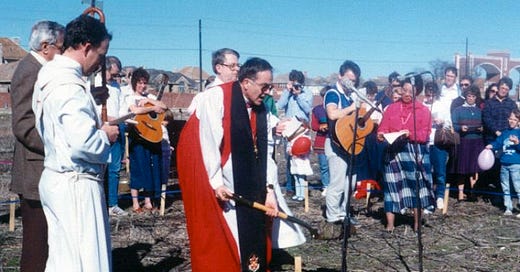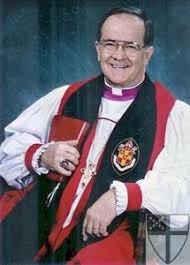Saying Goodbye to the Bishop of Dallas
A trip to seeing a dying man brought closure for me and for him.
Note to Readers
This is a tender departure from the Christ Church Stories. It’s not a tale of strategy or ministry growth, but of memory, gratitude, and the quiet courage of a bishop who gave me my first chance. The regular series resumes tomorrow.
Tomorrow’s story at 6:12 AM will be an important account of the lead-up to and our departure from the Episcopal Church.
Before you read, a quick update:
We’re in the midst of a Subscription Drive for The Anglican, and I’m grateful to say that over the last 12 days, 30 new Paid Subscribers have joined. Praise God. (Our goal is 70, so we have work to do!)
If you’ve been reading and benefiting from these stories, would you consider becoming a Premium Subscriber? It’s $8/month or $80/year. Think of it like passing the plate in church—the worship is always free, but your support makes it possible.
Saying Goodbye to a Bishop
A personal story of farewell and thanks
I’ve been writing these stories to remember and reflect on my years at Christ Church in Plano, Texas. Every word has been true. Each story is an offering—to honor people, to share the real feelings of ministry, and to give thanks to God.
This one is different. It’s not about growth or buildings. It’s about a visit, a goodbye, and a bishop who, like all of us, was a mixture of strength and struggle.
The Offer I Never Expected
I never wanted to be a church planter. In 1985, I had simply run out of options at my post at Church of the Epiphany in Richardson. That’s when Bishop Donis D. Patterson of Dallas offered me the chance to plant a church in Plano. I had no idea what I was doing. But coming to Plano was the second-best thing that ever happened to me. (Marrying Fran remains the first, of course.)
The bishop bet on me—and I never forgot that.
Twenty years later, we heard Bishop Patterson’s health was failing fast. Fran and I decided to fly to Orlando, where he and JoAnn were living in retirement, simply to say thank you.
A Holy Visit
We arrived at a modest assisted-living apartment in Winter Park, Florida. JoAnn greeted us at the door with her characteristic warmth and ushered us in.
When Bishop Patterson entered the room, I hardly recognized him. He looked much more frail than I had imagined—stooped over a walker, in pajamas and a bathrobe that looked almost liturgical. But his eyes still twinkled, and his familiar impish grin welcomed us.
He pushed the walker aside and wrapped me in a full embrace, trembling with emotion. Then, collecting himself, he invited us to sit.
We spoke of family, churches, and the Diocese of Dallas. He remembered everything. His love for the Diocese—its institutions, clergy, and churches—was still burning. He shared a few regrets from his time as bishop.
With unexpected honesty, he asked for forgiveness for some strained moments between us. In that moment, I was not a rector. I was his confessor and I was asked to forgive him a few mistaken comments that hurt me.
He also shared something that’s stayed with me: “Bishops are quickly forgotten.” He wasn’t bitter—just surprised at how swiftly the world moves on.
I told him how thankful I was for his trust in 1985. I told him that Christ Church had become a spiritual gateway for thousands of people. We gave him a photo album filled with pictures from those two decades.
He turned its pages, smiled, wept, and smiled again.
A Silver Dollar and a Cope
Then, true to form, he made a symbolic gesture.
He gave me a silver dollar, telling me about Bishop C. Avery Mason, who had used a silver dollar to draw circles on a map of North Texas as he planted churches—over 100 of them.
Then, with JoAnn’s help, Bishop Patterson stood. He presented me with a cream-colored cope, hand-made by Margaret Jacoby of the Diocese.
“The clasps on this cope,” he said, “are from Bishop Mason’s cope. I want you to have it—though I’m not sure you wear this sort of thing at Christ Church.”
(We didn’t. But the gesture was not lost on me.)
We prayed with him—Fran, JoAnn, and I placing hands on him while I anointed him and prayed for his strength and peace. He ended with a hearty, “Amen,” then shuffled off to rest.
Before he turned the corner, I said softly, “Thank you, Bishop. And goodbye.”
A week later, Donis D. Patterson died at the age of 75.
Misfit
He never really wanted to be a bishop. He told me that plainly.
He was a priest at heart. A pastor more than a politician. And he served during one of the most conflicted seasons in the church. I recall diocesan conventions where he seemed weighed down by it all, almost surprised at how angry people were. Some years, I half expected him to resign during his address. One year, he did.
In some ways, I think he felt like a misfit in the Diocese of Dallas.
So did I.
The Diocese leaned higher-church than I was comfortable with. It was very clerical.
I had a heart for laypeople and their place in the life of the church. That’s why Christ Church, for at least a year or two, had a full-time clergy staff of one—me.
But for all the ways he may have felt out of place, Bishop Donis Patterson had one trait that every bishop must have.
He had courage.
Postscript
After Christ Church left the Episcopal Church, I thought long and hard about that cope and those clasps.
I didn’t feel right keeping them.
So I made an appointment with the current bishop of Dallas and returned them. Quietly. Respectfully. Over lunch. I had the cope folded neatly and placed in large paper bag. I tried to make the bag special—I found one in our closet with the words Macy’s displayed on the side.
It was the right thing to do.
Grace and peace,
If this story moved you or gave you something to reflect on, please consider supporting The Anglican with a Premium Subscription.
It’s $8/month or $80/year—and helps me keep writing and sharing these stories with honesty and heart.
The Anglican is the Substack newsletter for LeaderWorks, where I share insights, encouragement, and practical tools for clergy and lay Christians. I’m also an author of over a dozen books available on Amazon.
If you are a Paid Subscriber, thank you! Thank you for supporting The Anglican and the ministry of LeaderWorks. If you are not a subscriber, please consider becoming one today.








It's always amazing and surprising what God does through people after many years without regular contact and how, in weakness, profound strength emerges.
There is nothing quite like asking for forgiveness or being asked for forgiveness. Grace embodied.
Thanks for all the stories—the mighty deeds of God!
Heart warming story. Thank you for sharing.
Bud Hopkins